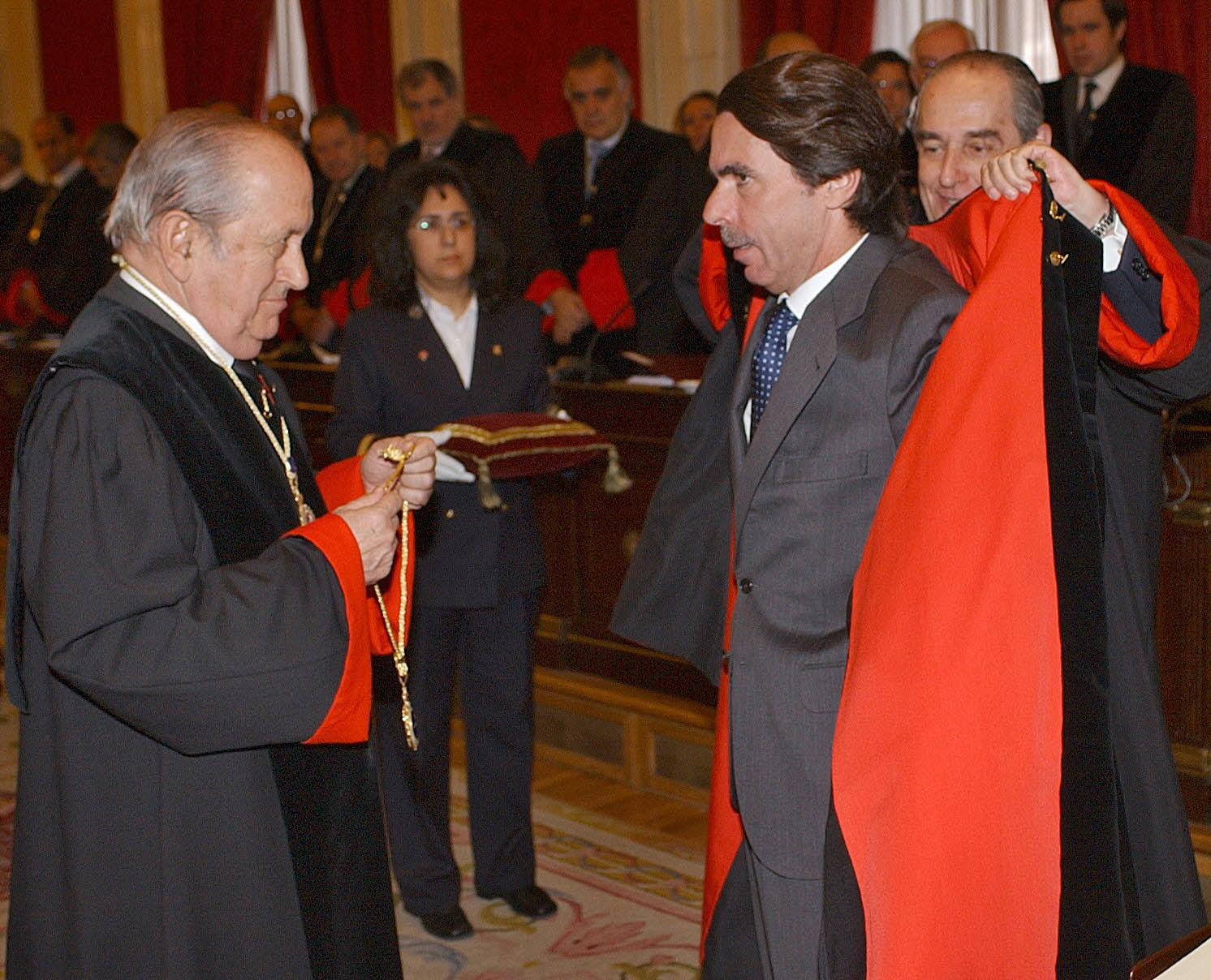Peñafiel Victim of King Juan Carlos
If something defined the diplomat
José Joaquín Puig de la Bellacasa
Urdampilleta, who died this April 20 from coronavirus, at the age of 89, it is that
somewhat idealized
monarchical devotion
that marked his existence. It ran in the family, since his father, a Barcelona engineer, was descended from the Can Puig de la Bellacasa family, a lineage from Girona that dates back to the 13th century, and a cousin of his, Luis, belonged to Don Juan's private council. Something that caused that, when he moved with his parents to Madrid from Bilbao, where he was born, he joined the monarchical youths of Joaquín Satrústegui, whose objective was to restore the Count of Barcelona as King.
That and also his
Europeanism
, derived from his cosmopolitan training, because after graduating in Law, he expanded his studies at Oxford and Bruges, and later entered the diplomatic school. His first assignment as embassy secretary coincided with his wedding in 1960 with
Paz Aznar Ibarra, sister-in-law of the banker Emilio Ybarra
, and mother of his six children: José Joaquín, María, Paz, Jaime (who died in 2013), Eduardo and Gabriel.
All this led to Puig de la Bellacasa making the monarchical restoration his personal crusade, despite the fact that he never accepted any political position, along with 'Juanistas' critical of the dictatorship, such as Íñigo Cavero,
Álvarez de Miranda or Leopoldo Calvo Sotelo
, all figures highlights of the Transition. His ideal was a parliamentary monarchy similar to the European ones that would bring a democratic regime and the opening of Spain to the outside world. It was so important that in 1966 Jesús Pabón,
Don Juan's
trusted man
, proposed him to be the personal secretary of the Count of Barcelona in Estoril, but he preferred that he remain with his son Juan Carlos helping him to restore the Crown.
In 1974, as a counselor at the embassy in London, he was requested by Zarzuela as private secretary and confidant of the still Prince. There he carried out delicate tasks, acting as a liaison with the opposition to the Franco regime, carrying out relations with the press or promoting the future monarch abroad.
He was also the architect of the speech of his proclamation on November 22, 1975
, where Don Juan Carlos spoke of democracy and of being the king of all Spaniards. However, his personal confrontation with General Armada, then Secretary of the House and one of the leaders of 23-F, whose 'opusino' fervor clashed with the liberal spirit of the diplomat, led him to resign from office in 1976. "You will return. "Don Juan Carlos promised him, as it would actually happen.
On April 21, 1975, José Joaquín Puig de la Bellacasa was one of the 'godfathers' appointed by former president José María Aznar, for his entry into the Council of State.
Meanwhile, he served as
ambassador to the Holy See
, where he organized the first visit of John Paul II to Spain in 1982, and in London, promoting the first official trip of Elizabeth II to our country in 1984, the visit of the princes of Wales in 1987 or Margaret Thatcher's in 1988.
His brilliant management decided Don Juan Carlos to claim him again in Zarzuela,
in March 1990, this time as head of the Royal Household
.
The idea was for him to temporarily act as secretary until
Sabino Fernández Campo
, then at the head of the House, he retired, which was believed imminent. But Puig de la Bellacasa, who was returning to Zarzuela eager to materialize his ideal of monarchy, again ran into great obstacles, among them Sabino's reluctance to leave his post. And above all, a new era in Zarzuela, that of 'juancarlismo', where the 23-F and his commitment to freedom had turned that King Juan Carlos previously corseted by the nostalgic Francoism, an icon of democracy. In full felipismo and with the heyday of these 'beautiful people' complicit in love affairs like Boyer and Preysler, in this modern court of Juan Carlos I there was no room for nobles or Juanistas from Estoril.
In addition,
the Monarch, on the crest of the wave, was reluctant to accept guidelines in his reign and in his personal life
, something that the ambassador did not know how to assimilate.
Given her trust with Don Juan Carlos, she even went too far by suggesting that she give up certain friends, such as Marta Gayà.
Puig de la Bellacasa left Zarzuela for the second time nine months later, this time with no prospect of returning, a blow that did not sweeten the palatable Lisbon Embassy for which he was appointed.
Out of loyalty, he sealed his mouth, without saying a word about the episode, not even to his intimate friends at the Fénix hotel gathering, with whom he drank coffee every afternoon until 10 days before he died, he entered a hospital suffering from coronavirus.
According to the criteria of The Trust Project
Know more
Juan Carlos I
Real home
LOC
The 'traitors' monarchists who facilitated the Second Republic by 'pushing' Alfonso XIII into exile
PoliticsPodemos and IU want the Malaga City Council to withdraw the honors to Juan Carlos I
MallorcaThe King's sailing club, threatened with 'eviction'
See links of interest
2021 business calendar
Home THE WORLD TODAY
FC Augsburg - 1. FC Cologne
Barça - Zenit Saint Petersburg
Real Zaragoza - Sporting de Gijón
Elche - Levante
Genoa - Spezia

